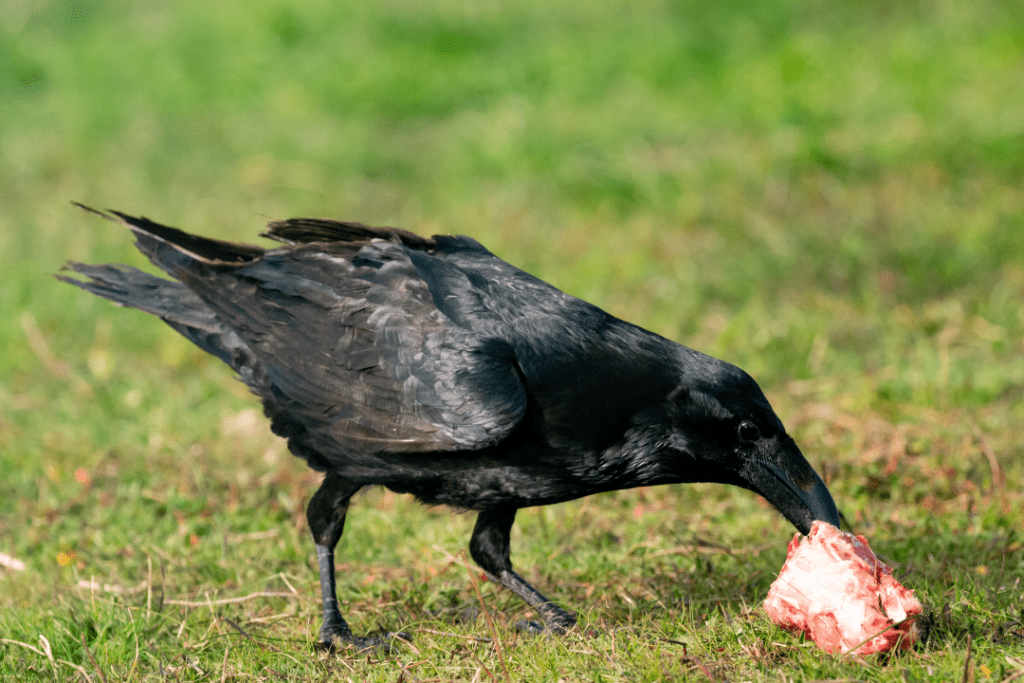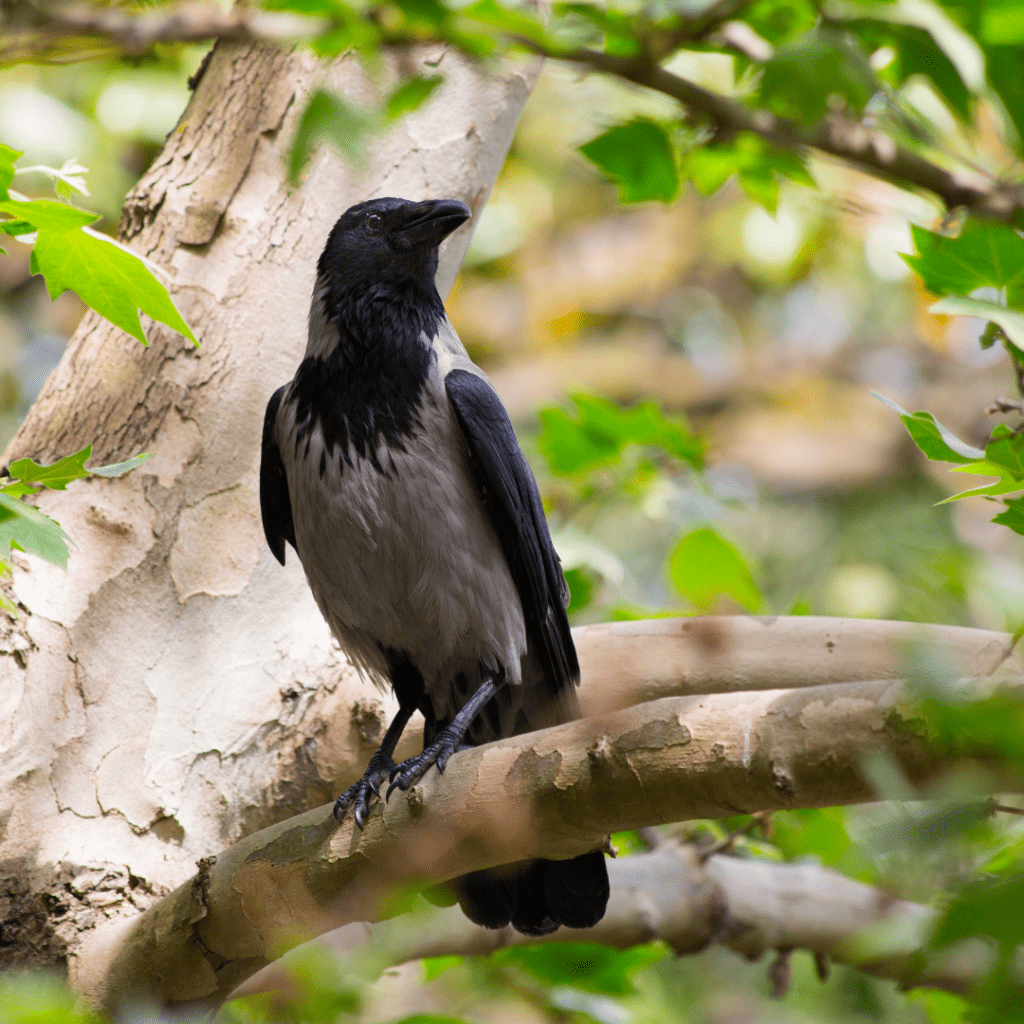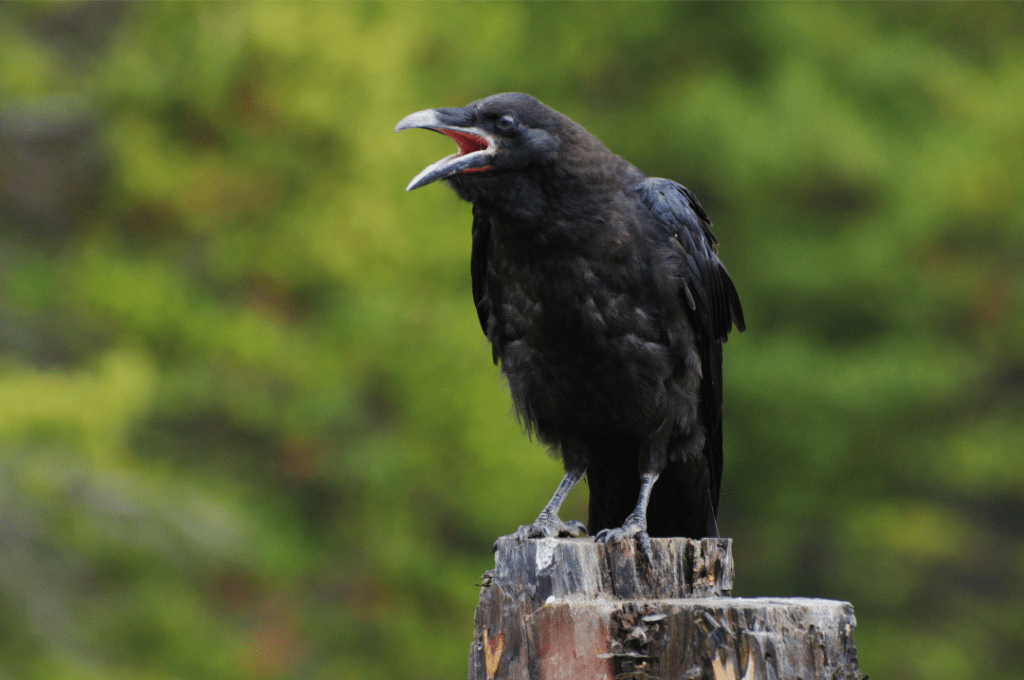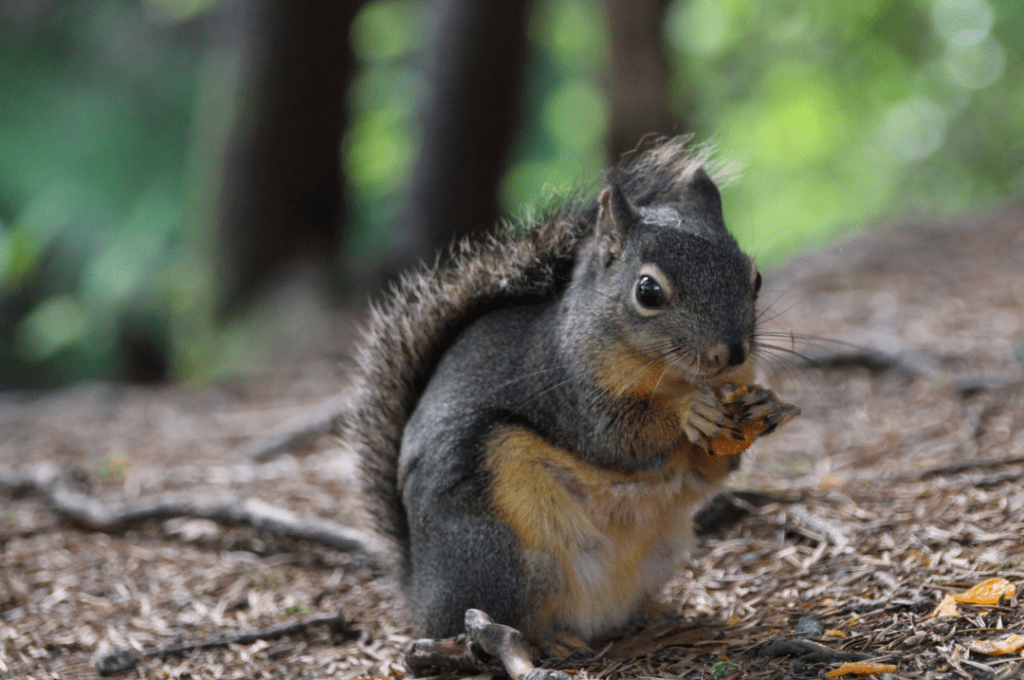Crows are everywhere. Their numbers have grown in recent decades, as these clever Corvids prove that there’s no level of human development that they can’t adapt to.
Like most animals that have learned to thrive in human-filled environments, crows are opportunistic feeders. The menu includes seeds, insects, human food waste, and small critters.

An animal as large as a squirrel is typically not a realistic prey option for a crow. However, crows will take a meal wherever they can find one.
Squirrels may become crow food in a number of circumstances. Most often, crows eat squirrels that are already dead and partially decomposed or torn apart by other animals.
What Do Crows Eat?
North America is home to several species within the Corvus genus of the Corvidae family. These include American crows, fish crows, and ravens. In the US, American crows are the most common and widespread Corvids, with year-round populations that cover nearly the entire country.
Like other urban birds such as pigeons and house sparrows, crows aren’t picky eaters.

The American crow diet consists of:
- Worms
- Insects
- Seeds
- Fruit
- Food waste from humans
- Eggs and baby birds
- Carrion and roadkill
- Small animals such as lizards and fish
Crows are adaptable omnivores. Their diets vary from place to place but usually contain high percentages of both plant and animal foods.
Are Crows Considered Birds of Prey?
Crows prey on live animals but aren’t considered birds of prey. That designation is reserved for species like eagles, falcons, hawks, and owls. Birds of prey, also known as raptors, are characterized by these traits:
- Carnivorous diet
- Hooked beaks
- Large feet with sharp talons
- Strong eyesight
Birds of prey are typically fast and agile flyers. They can often take down live animals that are quite large in relation to their own size.
In contrast, crows have straight beaks and eat mixed diets that include lots of plant foods.
Crows seize unique feeding opportunities, including the occasional mammal. However, they don’t have the physical skills required to frequently prey on large live animals.
The most notorious examples of crows taking on larger game involve livestock. While rare, crows and ravens have been known to attack newborn lambs and other young farm animals by pecking at their eyes. These events are most widely reported in the United Kingdom.
Crow Intelligence and Eating Habits
A crow’s extremely high intelligence plays a major part in its ability to consume a varied diet.
Regularly included in “smartest animal” rankings, crows may be the world’s most intelligent non-primate animals. In both their natural habitats and in controlled research settings, crows demonstrate impressive cognitive abilities and complex problem-solving skills.
One study found that crows could complete problem-solving tasks at a level comparable to a human seven-year-old. They figured out how to add objects to a water-filled tube in order to bring food rewards floating to the top. They even managed to choose solid objects over hollow ones in order to complete the task most efficiently.
In the wild, crows have been known to display basic tool skills for obtaining food. For example, crows have been observed using hooked plants to scoop insects out of holes.
Perhaps a crow’s most impressive form of intelligence is its environmental and social awareness.
Research has shown that crows tend to fly away more quickly when a human approaches them with a fixed gaze, whereas they may stay put if the person isn’t looking directly at them. Most other birds simply scatter whenever a human approaches.

Furthermore, crows have learned to recognize and adapt to human faces, even in the wild. They’ve even been known to exhibit gift-giving behavior to humans that they take a liking to.
With such advanced intelligence, it’s no surprise that crows are able to pursue food opportunities that similar-sized birds might not consider. That includes the occasional attack on larger, more difficult prey such as squirrels.
Do American Crows Prey on Squirrels?
When seeking a meal, crows don’t typically rely on brute strength or athletic hunting skills. While raptors like hawks and ospreys soar, swoop, and strike, crow hunts are usually of the hopping and pecking variety.
Most of a crow’s calorie intake comes from foods that are either plant-based, already-dead animals such as roadkill, or other scavenged foods such as human garbage.
Live prey options for crows are typically small enough to take on without a major risk to the hunter. These include insects, grubs, worms, and the occasional lizard or baby bird.
While live squirrels aren’t typically an easy source of food, crows are adventurous feeders. They won’t pass up an easy mammal meal when the right opportunity presents itself.
Crows and Predation of Live Squirrels
A healthy adult squirrel is an impractical prey option for a crow.
Adult American crows and adult grey squirrels are similarly sized. Each weighs slightly over one pound.
Along with their imposing size, squirrels are quick and feisty. They’re not easily killed by non-raptor birds who can’t attack with great speed and power.
Even if a squirrel was easy to prey on, it wouldn’t be easy to eat. Crow beaks aren’t strong enough to efficiently tear apart mammal flesh—that’s why they’re known to target their prey’s eyes.
Killing and eating a squirrel takes a lot of work, and usually isn’t worth the trouble.
However, under the right circumstances, a squirrel becomes a viable food source.
When Would a Crow Eat a Squirrel?
Crows may feed on squirrels that are:
- Already dead or dying
- Injured
- Young
Crows and squirrels share an enormous habitat range. Each is well-adapted for life among humans in urban and suburban settings. With millions of crows and squirrels living side by side, the occasional skirmish is bound to occur.
Note: bird vs squirrel predation goes both ways. Squirrels, like crows, are opportunistic omnivores that are known to prey on bird eggs and baby birds.
A crow might investigate a potential meal when it spots a squirrel in trouble. A baby separated from its mother, an injured or stunned squirrel, or one that’s trapped or stuck could all attract a hungry crow.
Compared to a swift and brutal raptor attack, a crow may operate more slowly.

Crows don’t possess the weaponry required to make a fast kill. So, a hunting crow sometimes proceeds gradually, sizing up the prey and pecking at its weak spots. The predation may look more like an act of curiosity than of aggression.
Most often, crows feed on squirrels that are already dead. Squirrels are among the most common roadkill victims, providing plenty of semi-fresh meat for crows that don’t mind eating their dinner off of the pavement.
Should You Interfere if You See a Crow Attacking a Squirrel?
Squirrels are cute, and nature is brutal. If you come across a crow attacking a live squirrel, you may be tempted to come to the little guy’s rescue.
Squirrels are common prey for hawks and other raptors. However, the dynamic is different when the aggressor is a smaller bird like a crow that we don’t typically think of as a big-game hunter.
Unable to make a fast kill, a crow might seem to be torturing its prey. A crow attacking a young or injured squirrel might drag the hunt out in a slow and agonizing process. It’s understandable for bystanders to consider shooing the crow away to put an end to the suffering.
While every situation is unique, it’s generally not a good idea to come between one wild animal that’s preying on another. This is true even when the hunt is gruesome and painful to observe.
A healthy squirrel would be able to evade a crow’s advances. A squirrel that’s being pursued by a crow was probably already suffering before the attack began. Predation is likely occurring because the crow noticed a squirrel that was struggling to move normally, such as due to a broken limb or blindness.
Even if the prey is a baby squirrel, it’s likely that an injury has taken place or that the baby is an orphan.
It might seem like an act of mercy to shoo a crow away from its intended meal. Sadly, you might be merely prolonging the prey animal’s suffering. If the squirrel is sick or injured, it will simply be attacked in short order by another predator.
Although crows typically target smaller prey, their willingness to occasionally pursue larger fare is impressive.
If you spot a crow attacking a squirrel, it’s usually best not to intervene. You also might not want to stick around for the show—death by crow is a rough way to go.

James has always been an avid outdoorsman. Since a kid, he kept a journal of all the different birds and species he saw. Now he wants to share his passion with other birders with Happy Birding!
